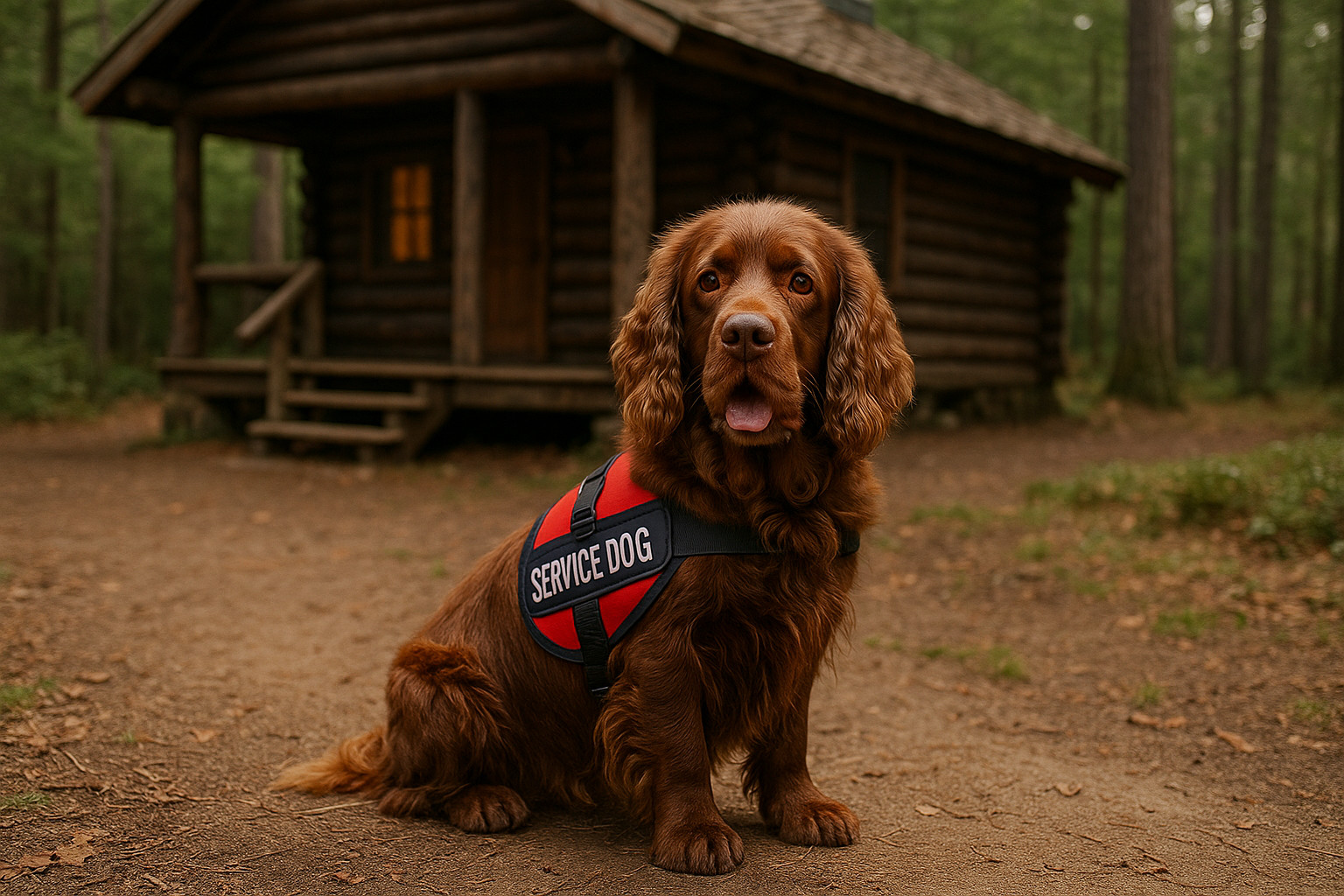Sussex Spaniel as a Service Dog
Get Your Documents

As we delve into the world of service dogs, it’s important to examine the qualities that make different breeds suitable for this role. The Sussex Spaniel is often overlooked but deserves recognition for its unique attributes. This article will explore the Sussex Spaniel in the context of service work, examining its physical characteristics, temperament, types of service work it excels in, health considerations, and trainability.
Sussex Spaniel Overview
The Sussex Spaniel, with its distinctive appearance and charming demeanor, traces its roots back to England. Known for its golden-liver colored coat and soulful expression, this breed was originally developed as a hunting dog. Despite its outdoor origins, the Sussex Spaniel has found its place as a beloved companion, blending well into various settings, including service work.
Physical Characteristics
The Sussex Spaniel is a medium-sized dog, typically weighing between 35 to 45 pounds and standing around 13 to 15 inches tall. Its sturdy and compact body is well-suited for tasks that require endurance rather than speed. The breed’s drooping ears, expressive eyes, and low-set body contribute to its unique, endearing appearance.
- Size and Build: The Sussex Spaniel’s moderate size makes it manageable in both urban and rural environments, allowing for ease of transportation and accommodation in different settings.
- Coat and Maintenance: Its coat, while beautiful, requires regular grooming to prevent matting and to maintain its striking appearance. This can be important for public perception when working in service roles.
- Endurance: The breed’s history as a hunting dog means it has a good level of endurance, which is crucial for prolonged working hours common in some service roles.
Temperament and Attitude
The Sussex Spaniel’s temperament is one of its most valuable assets as a service dog. Known for being gentle, loyal, and affectionate, this breed tends to form strong bonds with its handlers, which is essential in service work.
- Temperament Traits: Friendly and calm, the Sussex Spaniel is less prone to anxiety compared to other spaniels, making it suitable for work in varied environments, from bustling city streets to quieter residential areas.
- Attitude in Public: Their generally serene and stable demeanor means they are less likely to become reactive to loud noises or sudden movements, which can be common stressors when in public.
- Loyalty and Affection: This breed’s strong attachment to its owner can help reinforce commands and working partnership, which is beneficial in service dog roles where reliability and trust are paramount.
Types of Service Work
Although the Sussex Spaniel is not the most common choice for service work, its unique attributes might be called upon in specific situations where its skills are particularly advantageous.
- Emotional Support and Therapy Work: The Sussex Spaniel’s gentle and calming presence serves well in providing emotional support and therapy, spreading comfort and stability to those in need.
- Assistance for Individuals with Anxiety or PTSD: Due to its affectionate nature and non-reactive temperament, it may excel in roles that support individuals with anxiety or PTSD, providing grounding and reassurance.
- Hearing Assistance: With acute hearing, the Sussex Spaniel can be trained to alert individuals to important sounds, making it suitable as a hearing assistance dog.
Health Considerations
Health is a critical factor in determining the suitability of any breed for service work. The Sussex Spaniel, like any breed, has certain health predispositions that must be considered.
- Typical Health Concerns: Common health issues in Sussex Spaniels include intervertebral disc disease, ear infections due to their droopy ears, and hip dysplasia.
- Importance of Regular Veterinary Care: Regular health checks and proactive management of potential issues are essential to maintain a Sussex Spaniel’s fitness and ability to perform in service roles.
- Longevity and Working Life: With a lifespan of around 12 to 15 years, a well-cared-for Sussex Spaniel can have a meaningful working life, provided it is monitored and well-maintained.
Training and Suitability
Training is a critical aspect of developing a competent service dog. The Sussex Spaniel’s trainability is influenced by its intelligence and temperament.
- Intelligence and Problem-Solving: The Sussex Spaniel is described as having a moderate level of intelligence. It can learn tasks and commands with patience and consistency in training.
- Willingness to Learn: Although not as quick to train as some other breeds, the Sussex Spaniel’s strong desire to please its owner can be leveraged to foster obedience and reliability.
- Independence and Obedience: While adaptable, Sussex Spaniels do require persistent training efforts to ensure they understand and execute commands effectively. Their slightly independent streak means that a firm but gentle approach may yield the best results.
Summary of Sussex Spaniel
In conclusion, the suitability of the Sussex Spaniel as a service dog depends on matching its strengths with the needs of the role it will fill. This breed is not a typical choice for every type of service dog work but shines in areas where its loyalty, gentle demeanor, and manageable size are assets.
Key Strengths and Suitability:
- Gentle and Loyal Temperament: Excellent for emotional support and therapy roles.
- Moderate Size: Ideal for environments where a smaller, patient dog is needed.
- Calm Demeanor: Less reactive and suitable for noisy or stressful public environments.
Potential Challenges:
- Health Maintenance: Requires regular health monitoring to avoid common breed-specific issues.
- Training Needs: Needs consistent, patient training to harness its problem-solving potential effectively.
- Coat Maintenance: Demands regular grooming, which may not suit all prospective handlers.
These considerations should guide potential handlers and trainers in determining if a Sussex Spaniel is the right match for their specific service dog needs.
Get Your Documents
Example State Cards













